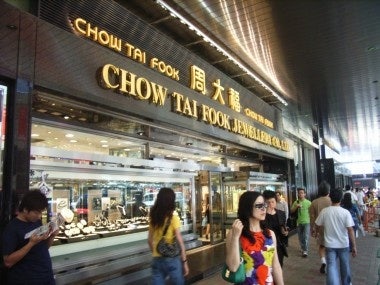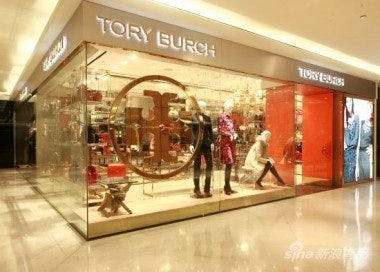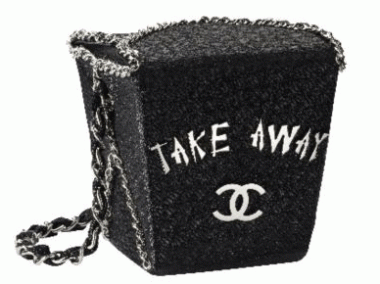The Growth Of China's Luxury Market "Is Alluring. But...In The Early Stages"#
A roundup of news from China’s luxury retail market, from the difficulties facing naïve brands in China to Tory Burch's digital success and the Luxury Institute's newest Luxury Brands Status Index.
China's Luxury Market is No Bed of Roses (Wall Street Journal)#

Chow Tai Fook could raise up to $2.8 Billion in its upcoming Hong Kong IPO (Image: Wikipedia)
The Wall Street Journal writes today that the Hong Kong jewelry chain Chow Tai Fook's upcoming IPO prospectus offers an "antidote" to the bullishness surrounding China's luxury market. Included in the prospectus, the WSJ notes, are a few "gems" that illustrate the difficulties that luxury brands are facing when looking at greater expansion in the mainland China market, including scarce prime retail locations and intense competition to secure this real estate. Considering Chow Tai Fook hopes to open 500 new locations throughout China in the next five years, if an expected dip in China's property market occurs, "further
rapid expansion into good locations#
(emphasis ours) will be tough."
Additionally, Chow Tai Fook's success in the mainland China market (the jeweler has opened an average of 179 stores there annually over the last three years) could be difficult to sustain if China's economy slows. The Wall Street Journal holds that the company will be highly vulnerable to a drop in consumer spending like the one seen in 2009. From the article:
Beyond that, the company says competition is tough; intellectual property rights are difficult to enforce; economic reform and business law are inconsistent; and labor costs are rising sharply. All this helps explain why the company says 94% of its outlets—those in China—account for just 56% of turnover. Locations in Macau and Hong Kong lay claim to the remaining 44% of sales, boosted by tourists from the mainland who come to shop at lower tax rates—another risk, should Beijing decide to cut taxes on the mainland too.
The greatest takeaway from this article isn't new, but worth repeating: companies should be optimistic about the China market, with its massive potential, but that optimism must be tempered with a clear understanding of the new realities of the market. Shoppers in top-tier cities are more discriminating; the best real estate is now hard to come by and increasingly expensive; some consumers will cut back if a wider perception of an economic slowdown occurs; and brands that depend too much on mainland Chinese tourists to spend in Hong Kong or Macau stand to lose if China's much-maligned luxury taxes are reduced.
How Digital Marketing Fueled Fashion Label Tory Burch’s Global Expansion (Mashable)#

Tory Burch's first mainland China location in Beijing
Mashable looks this week at the role that digital marketing has played in building the American fashion brand Tory Burch. Launched in New York in 2004, Tory Burch made its mainland China debut this May at Beijing's Shin Kong Place after opening two boutiques in Hong Kong, both of which proved highly popular with visiting tourist-shoppers. Since then, the brand has launched a second location at Tianjin’s Florentia Village outlet mall, and is planning a broader nationwide push over the next few years. Like fellow American premium brand Coach, whose lower price-points and intense digital and old media strategy have fueled impressive growth in China, Tory Burch has been among the most adept users of digital marketing and e-commerce in that country.
As Jing Daily previously noted, these are two factors that are not only important in China, they're essential to luxury market success. From Mashable's interview with Tory Burch chief marketing officer, Miki Berardelli:
Mashable: What have been among the biggest marketing and ecommerce challenges as you’ve expanded into new markets, particularly China?
Berardelli:
China’s fascinating. The rate at which the Chinese sector is embracing ecommerce is unlike anything I’ve ever seen. The challenge lies in understanding the landscape and deciding what makes sense for our brand, just as we do here. We launched our first Weibo site in support of the opening of our first store in Bejing. We are currently building ecommerce-enabled sites to support the markets that we’re in in Europe and in China.
...
M: What does your current investment in social media look like?
B:
We’re currently on Facebook, Twitter, Flipboard, Tumblr, Foursquare, YouTube, and Weibo in China. [Those accounts] are run by a small team of two people, except for Twitter, which is run by Tory herself, and Weibo, which is run by our team in Shanghai, in partnership with our editorial team in NYC. [Tory has] always embraced social media, and if it feels right for our brand, we’ll launch it, test our way into it, learn quickly and make adjustments as appropriate.
Wealthy Consumers From China and Japan Rank Luxury Brands in Four Categories (MarketWire)#

Chanel still ranks among the most popular luxury brands in both China and Japan
This week, the New York-based Luxury Institute released its newest Luxury Brands Status Index (LBSI), which ranks dozens of luxury brands based on responses from consumers in Japan and China. Respondents for this year's LBSI, who are at least 21 years of age and earn the equivalent of at least $185,000 per year (1 million Chinese yuan or 15 million Japanese yen), rated each brand on quality, exclusivity, social status, overall ownership experience, price worthiness, willingness to recommend the brand and likelihood of purchase.
As expected, "European stalwarts" ranked highest on the index, leading Milton Pedraza, CEO of the Luxury Institute, to remark, "European luxury brands are warmly received by wealthy shoppers throughout Asia," adding that China's luxury market remains "red hot." From MarketWatch:
Based on overall LBSI scores, the top luxury brands rank as follows:
Hotels
China: Fairmont Hotels & Resorts; JW Marriott; Aman Resorts
Japan: Ritz-Carlton; Orient-Express Hotels; Aman Resorts
Handbags
China: Chanel; Louis Vuitton; Dior
Japan: Hermès; Chanel; Louis Vuitton
Women's Fashion
China: Chanel; Dior; Hermès
Japan: Hermès; Chanel; Louis Vuitton
Men's Fashion
China: Giorgio Armani; Versace; Brioni
Japan: Hermès; Louis Vuitton; Burberry